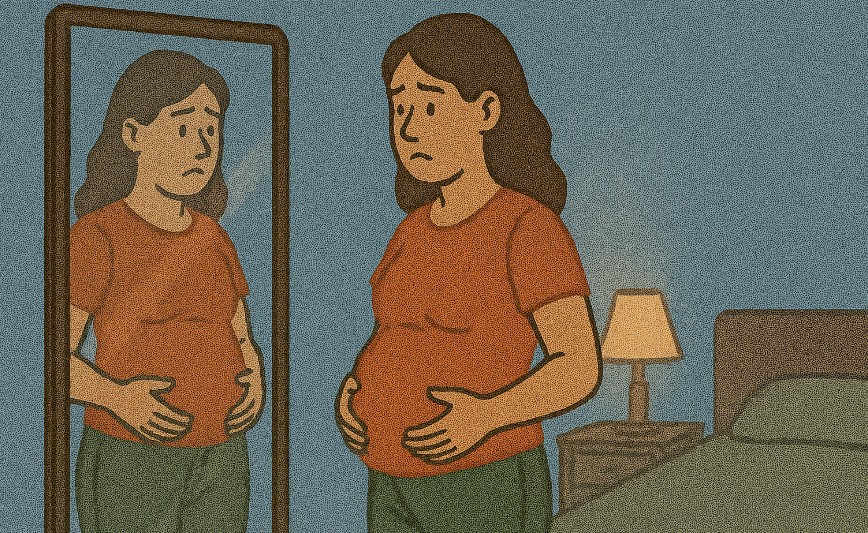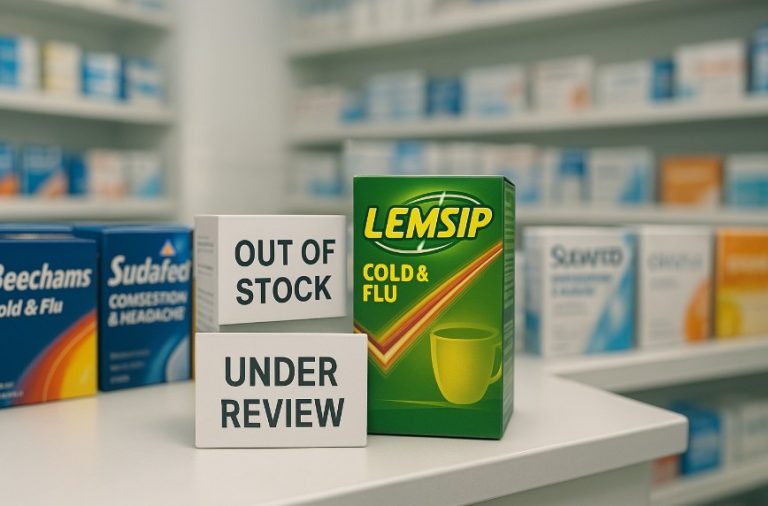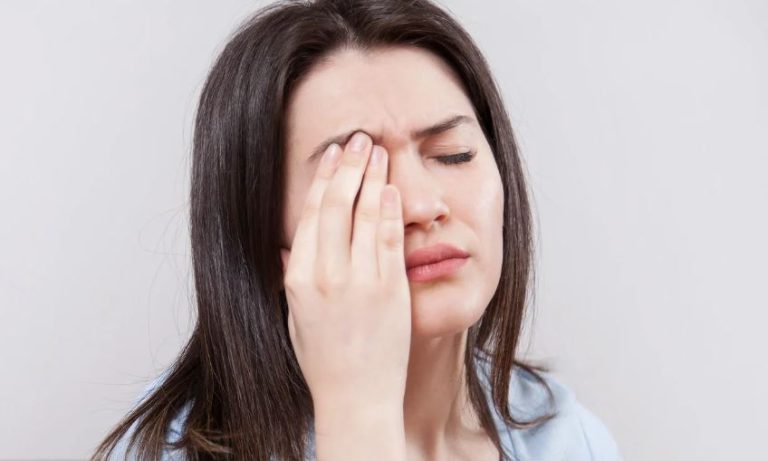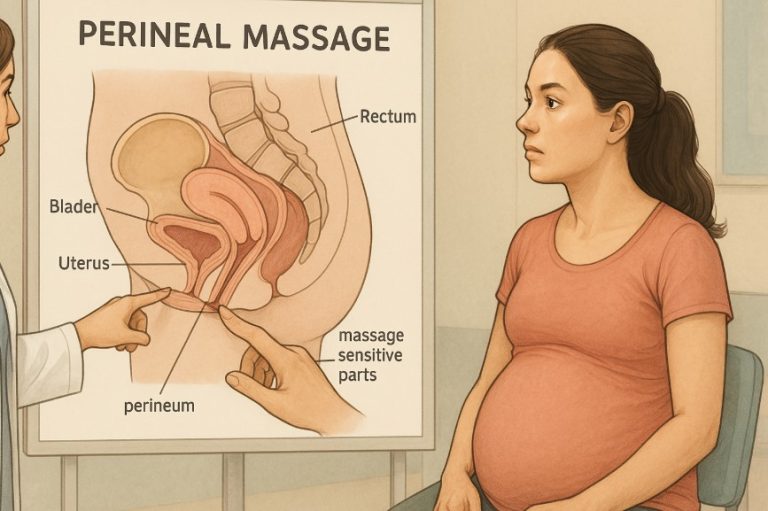Why Am I So Bloated I Look Pregnant? – 15 Common Reasons
Bloating is an uncomfortable and often distressing condition that affects many people at some point in their lives. For some, the sensation can be so intense that their abdomen appears swollen to the point it mimics a pregnancy bump. If you’ve ever wondered, “Why am I so bloated I look pregnant?”, you’re not alone. This article explores 15 common reasons for this sensation, as well as advice on managing it effectively.
What Does It Mean to Have Abdominal Bloating and a Distended Stomach?
Abdominal bloating refers to a feeling of fullness or tightness in the stomach, often accompanied by visible swelling or distension. Unlike fat gain, which is gradual and consistent, bloating can appear suddenly and often fluctuates throughout the day. In many cases, bloating results from the accumulation of gas or fluid in the digestive system.
It’s important to distinguish bloating from other causes of abdominal enlargement, such as weight gain, fibroids, or even pregnancy. Bloating typically resolves within hours or days, whereas other causes may persist or worsen.
15 Common Reasons Why You’re Looking Bloated Like Pregnant
1. Overeating or Eating Too Quickly

When people eat large quantities of food or consume meals rapidly, it puts pressure on the digestive system. The stomach stretches to accommodate the extra volume, and the digestive process slows down. This combination leads to bloating and a visibly swollen abdomen.
Eating too quickly also increases the likelihood of swallowing air, which adds to the discomfort. This air can become trapped in the digestive tract, making the belly appear distended.
To avoid this, it’s important to eat mindfully, chewing food thoroughly and allowing time for the stomach to signal fullness.
2. Excessive Gas and Trapped Air
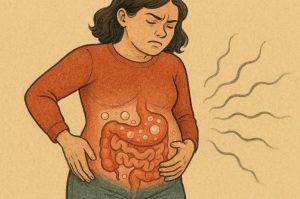
Gas is a natural byproduct of digestion, especially when the body breaks down certain carbohydrates. However, when gas builds up excessively, it can cause uncomfortable pressure in the abdomen, leading to bloating.
Trapped gas may also be due to:
- Swallowing air while eating or drinking
- Consuming high-fibre foods that ferment in the gut
- Disruption in gut flora (gut bacteria)
The sensation can be so intense that many describe feeling “six months pregnant” by the end of the day.
3. Food Intolerances and Sensitivities
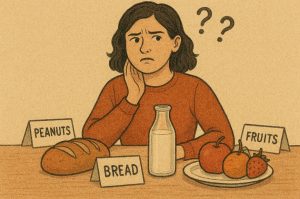
Food intolerances occur when the body struggles to digest certain ingredients. This incomplete digestion can lead to fermentation in the gut, producing gas and bloating.
Common intolerances include:
- Lactose: Found in milk and dairy products
- Gluten: Present in wheat, barley, and rye
- Fructose: A natural sugar found in fruits and sweeteners
Unlike food allergies, which involve the immune system, intolerances typically trigger digestive symptoms like bloating, gas, diarrhoea, or constipation.
4. Constipation and Poor Bowel Movements
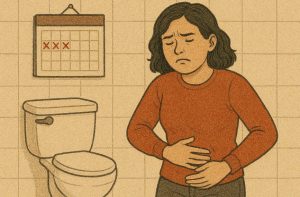
Constipation is a common cause of bloating, especially in people who do not pass stools regularly. When stool builds up in the intestines, it increases abdominal pressure and can lead to visible distension.
Poor hydration, low fibre intake, and sedentary habits are leading contributors to constipation. Straining or discomfort during bowel movements often goes hand-in-hand with this type of bloating.
Improving hydration, eating fibre-rich foods, and increasing movement throughout the day can significantly ease symptoms.
5. Irritable Bowel Syndrome (IBS)
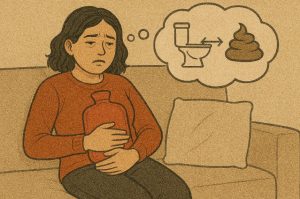
IBS is a chronic condition that affects how the bowel functions. One of the hallmark symptoms of IBS is bloating, which may intensify after meals or during stressful periods.
Individuals with IBS often report a fluctuating appearance of their abdomen — flat in the morning and bloated by evening. Bloating may be accompanied by:
- Cramping
- Diarrhoea or constipation (or both)
- Urgency to pass stool
IBS management often requires dietary changes, stress reduction, and medication prescribed by a GP or gastroenterologist.
6. Hormonal Fluctuations and Period Bloating
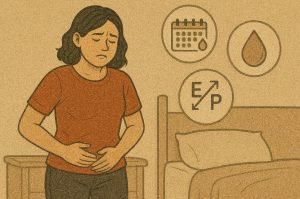
Hormonal changes throughout the menstrual cycle can influence fluid retention and digestion. Bloating typically worsens in the luteal phase (after ovulation and before menstruation), when progesterone levels rise.
This hormone relaxes the muscles of the digestive tract, slowing digestion and increasing the chance of bloating. Many women also retain water before their period, which adds to the sensation of abdominal heaviness.
This cyclical bloating is usually temporary and resolves once menstruation begins or shortly after.
7. Water Retention and Fluid Build-Up
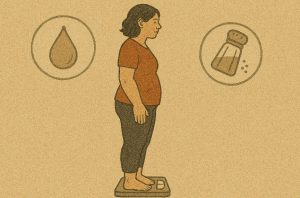
Water retention, or oedema, occurs when excess fluid builds up in the body’s tissues. In the abdomen, this can create the appearance of bloating.
Contributing factors include:
- High salt intake
- Hormonal changes
- Hot weather
- Certain medications (e.g., contraceptives or steroids)
In some cases, fluid build-up can be linked to liver or kidney conditions, so persistent symptoms should not be overlooked.
8. Gut Health Imbalance and Dysbiosis
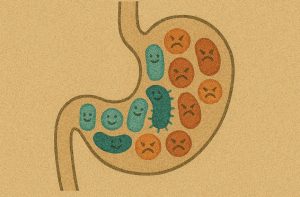
The gut microbiome plays a crucial role in digestion. When there’s an imbalance in the ratio of “good” and “bad” bacteria known as dysbiosis, digestion can become inefficient, leading to gas and bloating.
This imbalance may be caused by:
- Antibiotic use
- Poor diet
- High levels of stress
Symptoms of dysbiosis often include bloating, gas, irregular stools, and a sensation of fullness even after eating small meals. Rebalancing gut bacteria with probiotics and fermented foods can help support a healthier digestive system.
9. Eating Gas-Producing Foods
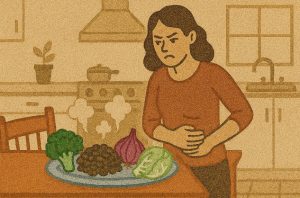
Some foods naturally produce more gas when broken down by the digestive system. This can cause temporary but noticeable bloating, especially in people with sensitive guts.
Common offenders include:
- Cruciferous vegetables (e.g., broccoli, cauliflower, cabbage)
- Legumes (e.g., lentils, beans, chickpeas)
- Onions and garlic
- Whole grains
Reducing portion size, soaking legumes before cooking, or cooking vegetables thoroughly can make them easier to digest.
10. Carbonated Drinks and Bloating
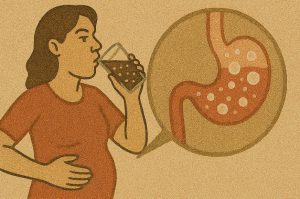
Fizzy drinks are carbonated with carbon dioxide gas. When consumed, this gas enters the digestive system and may become trapped, causing pressure and bloating.
Even sparkling water, though marketed as a healthier alternative to sugary sodas, can cause bloating in those prone to digestive issues. Limiting intake of carbonated drinks can help keep the stomach flat and reduce discomfort.
11. Swallowing Air (Aerophagia)
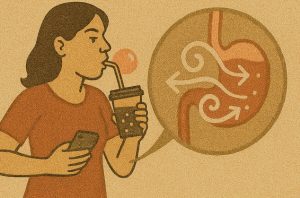
Aerophagia is the act of swallowing air, which often happens without realising. Habits such as chewing gum, drinking through straws, or talking while eating can all contribute.
When swallowed air builds up in the digestive tract, it creates pressure that results in a bloated belly. Reducing these habits and eating more mindfully can ease symptoms over time.
12. Stress and Anxiety
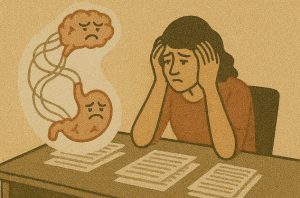
The connection between the brain and the digestive system often referred to as the “gut-brain axis” means that emotional distress can lead to physical digestive symptoms.
Stress and anxiety can:
- Slow down digestion
- Increase gut sensitivity
- Trigger muscle tension in the abdomen
All these changes may lead to bloating and a tight, distended feeling. Relaxation techniques such as deep breathing, yoga, or meditation can help regulate this response.
13. Sedentary Lifestyle
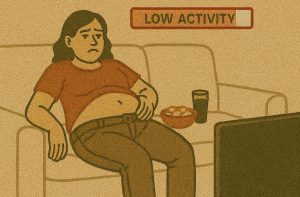
Regular movement helps the digestive system function efficiently. A sedentary lifestyle can slow down gut motility, making it harder for food and gas to pass through the intestines.
This delay results in bloating, discomfort, and the appearance of a distended belly. Even short walks after meals can stimulate digestion and reduce symptoms.
14. Underlying Health Conditions

In some cases, bloating is more than a temporary nuisance, it may signal a more serious health issue. Persistent bloating accompanied by pain, irregular bleeding, or weight loss should always be investigated.
Conditions that may cause bloating include:
- Endometriosis: When uterine tissue grows outside the uterus, causing inflammation and swelling
- Ovarian cysts: Fluid-filled sacs on the ovaries that may enlarge the abdomen
- Ascites: Fluid build-up in the abdomen, often due to liver disease
If bloating becomes a regular concern, particularly when paired with other worrying symptoms, medical consultation is essential.
15. When to See a Doctor for Chronic Bloating
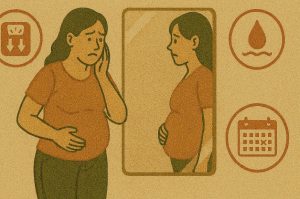
Most cases of bloating are harmless and manageable at home. However, there are signs that should not be ignored. You should see a doctor if bloating is:
- Persistent for more than a few days
- Associated with unexplained weight loss
- Accompanied by blood in the stool or severe pain
- Causing significant interference with daily life
A healthcare provider may recommend blood tests, imaging, or referrals to a specialist to determine the underlying cause.
Could My Bloating Be Mistaken for Pregnancy?
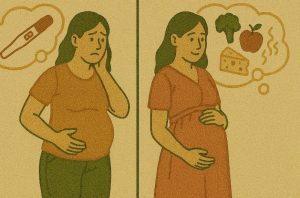
Yes, in many cases, bloating can look and feel so intense that it closely resembles the early stages of pregnancy. The abdomen may protrude outward in a rounded shape, and clothes may feel tighter, especially around the waistline.
This kind of bloating is often referred to as “pseudo-pregnancy” because of how it mimics the look of a baby bump. The sensation can be accompanied by discomfort, cramping, and even nausea symptoms that further blur the line between bloating and pregnancy.
Why does this happen?
- Gas and fluid build-up can cause the stomach to expand visibly.
- Slow digestion or constipation may lead to distension.
- Hormonal changes, especially during the menstrual cycle, may add to water retention and abdominal swelling.
However, there are key differences between pregnancy and bloating. For example, pregnancy-related changes are consistent and progressive, whereas bloating tends to fluctuate, often improving after passing gas or a bowel movement.
If there’s any doubt, taking a pregnancy test or consulting a GP can offer clarity.
Why Do I Wake Up with a Flat Stomach but Look Pregnant by Evening?
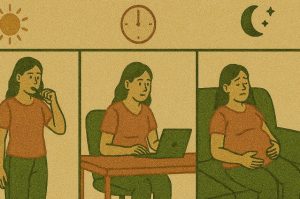
This is a very common experience known as diurnal bloating, a type of bloating that worsens throughout the day and improves overnight. Many people wake up with a flat or relatively normal-looking stomach, only to find it becomes increasingly distended by evening.
What causes this?
- Food Intake: As you eat and drink throughout the day, your digestive system processes food, which naturally produces gas and may cause the stomach to expand.
- Gravity and Posture: Being upright all day can lead to pooling of fluids in the lower abdomen, especially if you’re sitting for extended periods.
- Digestive Sluggishness: A lack of movement during the day can slow digestion, resulting in a buildup of gas and bloating.
- Stress: If your day is hectic or stressful, your gut may not function as efficiently, leading to delayed digestion and bloating.
This type of bloating is generally harmless but uncomfortable. If it becomes persistent or painful, it’s worth evaluating your diet, activity level, and stress management strategies.
Tips to Reduce Bloating Naturally
Bloating may be common, but that doesn’t mean you have to live with it. Making a few small lifestyle and dietary changes can have a big impact on your digestive comfort.
Here are some effective ways to naturally reduce bloating:
- Eat Mindfully: Chewing food thoroughly and taking your time with meals helps prevent swallowing excess air and allows for better digestion.
- Stay Hydrated: Water supports digestion and helps prevent constipation. Aim for consistent water intake throughout the day, rather than drinking large amounts at once.
- Limit Carbonated Drinks: Fizzy drinks introduce gas into the digestive system. Replacing them with still water or herbal teas can help reduce bloating.
- Keep a Food Diary: Track your meals and symptoms to identify trigger foods. Common culprits include dairy, gluten, artificial sweeteners, and cruciferous vegetables.
- Try Gentle Movement: Light exercise like walking, yoga, or stretching can stimulate digestion and reduce gas retention.
- Incorporate Probiotics: Probiotic-rich foods such as kefir, yoghurt, sauerkraut, and kimchi can help restore healthy gut bacteria and improve digestion.
- Avoid Overeating: Eating smaller, more frequent meals throughout the day is easier on your digestive system than large, heavy portions.
- Reduce Stress: Mindfulness practices like deep breathing, meditation, and progressive muscle relaxation can improve digestion by calming the gut-brain axis.
These strategies work best when combined and practised consistently. However, if symptoms persist despite lifestyle changes, it’s important to consult a healthcare provider for further evaluation.
Final Thoughts on Feeling Bloated and Looking Pregnant
Feeling bloated to the point of looking pregnant can be frustrating and concerning. However, in most cases, it stems from dietary habits, digestive issues, or temporary hormonal changes. Recognising the underlying cause is the first step towards relief. If symptoms persist or interfere with daily life, professional medical advice is recommended.
Frequently Asked Questions
What are the signs that bloating is serious?
Bloating that’s persistent, painful, or accompanied by other symptoms like weight loss or blood in stool may indicate a serious condition and should be evaluated by a healthcare professional.
How long should bloating last before seeing a doctor?
If bloating lasts more than a week or becomes a regular issue, it’s wise to seek medical advice to rule out underlying causes.
Can endometriosis make your stomach look pregnant?
Yes, severe bloating caused by endometriosis is often called “endo belly” and can give the appearance of being pregnant.
Why do I get bloated even when I haven’t eaten?
You may experience bloating from gas, hormonal fluctuations, or gut imbalances even without recent food intake.
Does drinking water help with bloating?
Yes, staying hydrated supports digestion and helps flush out excess sodium, reducing water retention and bloating.
Can bloating be caused by anxiety?
Yes, stress and anxiety can slow digestion, increase gas, and contribute to bloating through the gut-brain axis.
Is it normal to look pregnant after eating?
It can be. If the meal was large, high in salt, or gas-producing, the resulting bloating may temporarily resemble a pregnancy bump.

